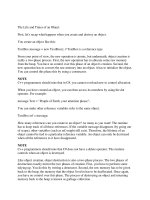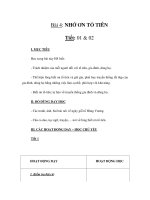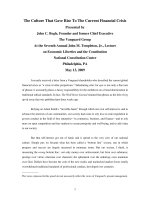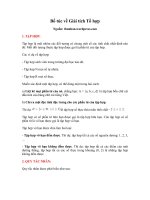Tài liệu The FEC Audit Process: What To Expect pdf
Bạn đang xem bản rút gọn của tài liệu. Xem và tải ngay bản đầy đủ của tài liệu tại đây (2.8 MB, 8 trang )
The FEC Audit Process:
What To Expect
Audit Division
Federal Election Commission
February 2012
FEDERAL ELECTION COMMISSION
Washington, D.C. 20463
Chair:
Caroline C. Hunter
Vice Chair:
Ellen L. Weintraub
Commissioners:
Cynthia L. Bauerly
Donald F. McGahn II
Matthew S. Petersen
Steven T. Walther
Staff Director:
Alec Palmer
General Counsel
Anthony Herman
INTRODUCTION
The Audit Division is authorized by the Commission to conduct audits of federal political
committees. These audits fall into three general categories: (1) all publicly financed Presi-
dential campaigns and national party convention committees that receive public financing;
(2) campaigns of federal candidates seeking election to a public office; and, (3) all other
federal political committees including political action committees and party committees.
The material that follows provides an overview of the audit process and offers answers to
frequently asked questions about the Federal Election Commission audit process. By an-
swering these questions, the Commission hopes to help committees and the general public
understand the basics of the process and what to expect when audited.
THE AUDIT PROCESS – AN OVERVIEW
1. Pre-Audit – First, the Audit staff will inform the Treasurer in writing that the Commission
has authorized an audit of the committee. Then, Audit staff will request preliminary materials
such as bank statements, bank account reconciliations and all accounting data maintained
by campaign management and accounting software. After the preliminary records are re-
ceived, an auditor will contact the committee to arrange a date and place for the audit. Most
audits are conducted on-site at your office; however, if an appropriate space is not available,
alternative locations (such as the committee’s counsel’s office) may be appropriate.
2. Fieldwork – The fieldwork portion of the audit begins with an entrance conference.
During this meeting, the committee will be given an outline of the audit procedures and will
be afforded an opportunity to explain how the records are organized and to ask questions.
The Audit staff will conduct an inventory of the committee’s records and, if the records are
not complete, fieldwork may be suspended until such time as they are. Subpoenas may be
issued by the Commission to obtain missing records.
Once the Audit staff determines that the records are substantially complete and well-orga-
nized, the Audit staff will:
a. review the committee’s disclosure reports to determine whether receipt and dis-
bursement information was properly reported and mathematically accurate;
b. conduct a reconciliation of bank account records as compared to the disclosure
reports filed; and
c. conduct other audit procedures as deemed necessary to determine whether the
committee substantially complied with the FECA.
During fieldwork, Audit staff may request further information on matters identified during
the audit.
At the end of fieldwork, an exit conference will be held. During this meeting, the Audit staff
will explain the results of their work and identify any potential findings that they anticipate
presenting to the Commission. These are Audit staff conclusions that will be reviewed by
the Commission before the final audit report is issued. The Audit staff will also request any
records that are still needed.
The length of time required for fieldwork depends on the volume of receipt and disburse-
ment transactions during the audited period, the organization and completeness of commit-
tee records, the audit scope and the issues that develop during the audit. If the records are
substantially complete, fieldwork typically takes two to three weeks.
3. Interim Audit Stage - The results from audit fieldwork will be reviewed and an Interim
Audit Report will be drafted. In some cases, the Commission’s Office of General Counsel
1
will perform a legal review of the report. If there are no proposed findings, the committee will
receive a Final Audit Report from the Commission. If the Audit staff has identified potential
findings, the committee will receive an Interim Audit Report of the Audit Division that ad-
dresses them.
4. Draft Final Audit Stage and Proposed Final Audit Stage – The Committee’s re-
sponse (if any) to the Interim Audit Report will be reviewed by the Audit Division (and in
some cases, the Office of General Counsel (“OGC”)), and a Draft Final Audit Report will be
prepared. This report sets forth the recommended findings that the Audit staff intends to
present to the Commission and will also include legal analysis, if any was provided by OGC.
The Committee may submit a response, and may request an Audit Hearing (see below).
5. Final Audit Report - After the committee’s response to the Draft Final Audit Report
and/or the hearing, the Commission will consider the recommendations of the Audit Staff,
as well as any responses from the Committee and testimony during any audit hearing, and
a Proposed Final Audit Report will be prepared for Commission approval. Once approved,
the Final Audit Report of the Commission will be sent to the committee. Once this report is
received by the committee, it will be placed on the Commission’s website along with Com-
mittee responses and other documents related to the audit.
1
Frequently Asked questions
WHY IS MY COMMITTEE BEING AUDITED?
Other than the mandatory audits of publicly financed Presidential campaigns and national
party convention committees, Section 438(b) of the Federal Election Campaign Act (FECA)
allows the Commission to audit a committee if its reports do not meet the threshold require-
ments for substantial compliance with the Act. Campaign Finance Analysts in the Commis-
sion’s Reports Analysis Division (“RAD”) review every report following detailed procedures
approved by the Commission. If questions arise concerning a committee’s compliance with
the FECA, the analyst may send the committee a Request for Additional Information (“RFAI”)
Letter which is made available to the public. Insufficient and/or untimely responses to these
inquiries increase the likelihood of an audit. At least four Commissioners must approve the
audit of any committee. In most election cycles, the Commission will conduct between 30
and 40 audits.
SHOULD MY COMMITTEE RETAIN LEGAL COUNSEL?
An attorney is not required under the Act; however, committees should feel free to retain
legal counsel. A designation of counsel form will be provided to the Committee at the begin-
ning of the audit, and may be submitted at any time during the process.
1 See FEC Directive on Processing Audit Reports at />2
WHAT RECORDS ARE NECESSARY FOR THE AUDIT?
It depends on the type of committee and the scope of the audit. Not every category of
records listed below is relevant to every type of committee. Examples of necessary records
may include:
RECEIPTS
• Bank deposit records.
• Copies of contribution checks greater than $50.
• Credit card merchant account statements and transaction processing records.
• Documentation for loans.
• Records for the redesignation and/or reattribution of contributions that would other-
wise exceed contribution limits.
• Documentation to demonstrate follow-up efforts for contributions that are from
questionable sources.
• “Best Efforts” documentation for follow-up communications with contributors who
failed to provide complete information.
DISBURSEMENTS
• Any check registers that were not part of the electronic records provided at the start
of the audit.
• Cancelled checks stored either on paper or electronically, along with documentation
for any wire transfers or other debits to the committee’s accounts.
• Invoices, receipts and other supporting documentation for disbursements in excess
of $200. This would include disbursements for payroll and those made via commit-
tee credit card. If the committee uses credit cards to make disbursements, the credit
card statements should also be provided for review.
• Documentation to support travel and other types of reimbursements to the candi-
date, staff and volunteers.
• Basis and calculations for the allocation of expenses between federal and non-fed-
eral accounts, as well as federal and Levin accounts. Also records for all reimburse-
ments from the non-federal and Levin accounts.
• Copies of literature, media ads, poll questions and phone bank scripts.
• Records to support the classification of disbursements as operating expenditures,
federal election activity, independent expenditures, coordinated expenditures, etc.
• Records for the non-federal and Levin accounts, if any, to allow for the verification
of allocated expenses.
• Records to support any debts owed by or to the committee.
Although this listing is not exhaustive, it covers the common types of records needed for
the audit.
3
WHAT TIME FRAMES ARE COVERED BY THE AUDIT?
Generally audits cover a two-year period beginning January 1 of the year before the election
and ending December 31 of the election year. At times, records for activity before and after
the audit period may be requested to establish the correct beginning and ending cash-on-
hand balances. Contribution records from earlier years may also be requested for candidate
committees.
WHAT ARE THE COMMITTEE’S OPPORTUNITIES TO RESPOND?
The audit process includes many opportunities for the committee to respond to any issues
identified by the Audit staff. They are as follows:
• During Audit Fieldwork– Committees are encouraged to resolve as many issues
as possible at this stage of the audit.
• 10 Day Response to Audit Fieldwork– After the exit conference, committees
have 10 business days to submit materials to the Audit staff to demonstrate that
a potential finding is not warranted. If the committee demonstrates that a potential
finding is not warranted, it will not appear in the audit report.
• Response to the Interim Audit Report– If the audit identifies material errors
or instances of non-compliance, they will be included in the Interim Audit Report
with recommendations for corrective action and/or a request that the committee
explain why the report is incorrect. The committee has 30 calendar days to respond
to the Interim Audit Report; however, extensions may be granted. The committee’s
response is provided to the Commission.
• Response to the Draft Final Audit Report and/or Request a Hearing – A Draft
Final Audit Report will be prepared after consideration of the committee’s response
to the Interim Audit Report. The committee will have 15 calendar days to make any
further response and/or request a hearing before the Commission. The Commission
has separate guidance for the hearing process.
2
• Enforcement– If any findings are referred to the Commission’s Office of General
Counsel or to the Office of Alternative Dispute Resolution (ADR) for further enforce-
ment, the committee will have additional opportunities to respond to the issues
raised.
• Program for Requesting Consideration of Legal Questions– In addition to
the opportunities noted above, the Program for Requesting Consideration of Legal
Questions by the Commission allows committees to request consideration of a staff
decision directly to the Commission. Specifically, when the Audit Division requests
that a committee take corrective action during the audit process, and the committee
disagrees based upon a material dispute on a question of law, the committee may
seek Commission consideration of the issue. The Committee will have 15 business
days to seek Commission consideration of the issue. The 15 day time frame begins
at the end of the committee’s audit exit conference response period.
3
2 See Procedures for Audit Hearings (2009) at www.fec.gov/law/cfr/ej_compilation/2009/no-
tice_2009-12.pdf
3 Program for Requesting Consideration of Legal Questions by the Commission (2011) at www.fec.
gov/law/cfr/ej_compilation/2011/notice_2011-11.pdf
4
5
DOES THE COMMITTEE NEED TO RESPOND TO REQUEST FOR
ADDITIONAL INFORMATION (“RFAI”) LETTERS WHILE BEING AUDITED?
Yes, while being audited, the committee should continue to respond to any RFAI Letters
received from RAD by the indicated due dates. Also, the committee should continue to file
reports as required. For more information, contact RAD at 202-694-1000 or go to www.fec.
gov/rad/index.shtml.
If you have additional questions after reading the brochure,
please contact the FEC:
Federal Election Commission
Audit Division
999 E Street, NW
Washington, DC 20463
(202) 694-1200 (local)
(800) 424-9530 (toll free)
(202) 219-3336 (for the hearing impaired)
6









